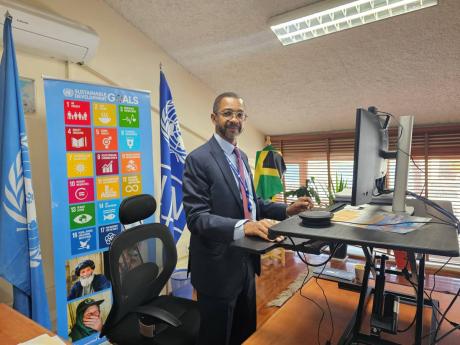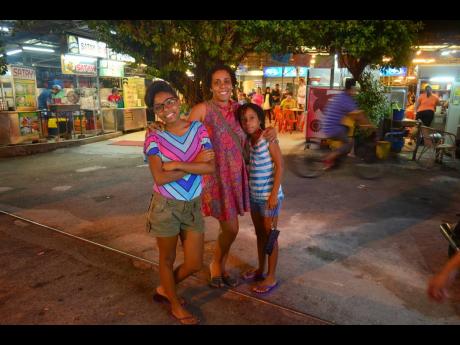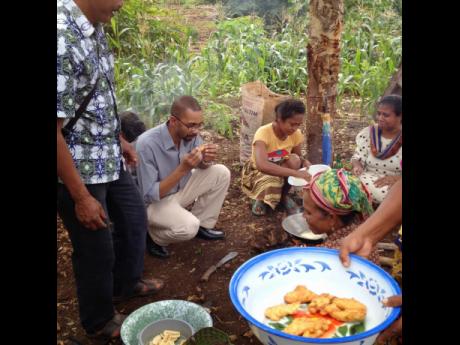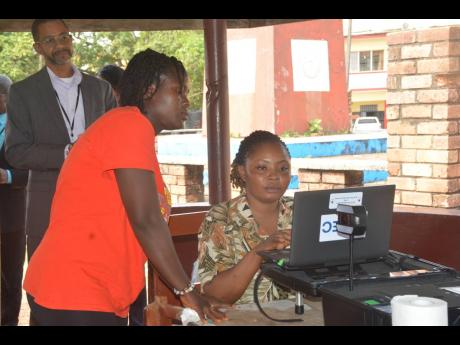Stephen Rodriques’ mission to empower
Jamaica’s and UNDP’s man in Afghanistan laser focused on the underserved
He is thousands of miles away from his family and the next three Father’s Day will see him in Afghanistan until his current tour ends, but distance is no barrier in celebrating this Jamaican gem whose life’s passion is serving the poor and empowering them for the future.
It has been three weeks since Kabul, Afghanistan, became the home and workplace of Jamaican Stephen Rodriques, who is the United Nations Development Programme (UNDP) resident representative there.
“In Afghanistan I will be focusing on a number of initiatives, including women’s economic empowerment, energy and electricity for the poor, basic needs services and infrastructure for poor communities, health initiatives to tackle HIV, malaria and tuberculosis and helping to revitalise the banking and microfinance sector, among other things,” Rodriques shared with The Sunday Gleaner from his home in Kabul, Afghanistan, of the grand task ahead of him.
Despite having other choices for placement, the small town boy – who was born into poverty in rural Jamaica and whose mother named him after the Christian martyr and saint – chose the country where nearly 75 per cent of its 40 million people are living in poverty and facing hunger.
Afghanistan has been a war zone for decades and the Taliban – who are not recognised by world governments but with whom they must work to help the country’s poor – have very strict laws. Very little premium is placed on women and girls and their education in the majority Muslim country.
The husband of former Senator Natalie Campbell Rodriques and father to beautiful daughters 24-year-old Alexandria (Alex) and 19-year-old Amanda, said because of the high security risks associated with his current assignment, he will not allow them to visit.
For now, he will meet up with his family in third countries. Although saddened that they won’t be able to spend Father’s Day with him in person, his family understands.
‘A proud people’
Describing Afghans as “a proud people with a long history of fighting for what they believe in”, Rodriques said he lives in a heavily militarised and armed compound and goes nowhere without a convoy of armoured vehicles and heavily armed security personnel.
The self-contained compound has two restaurants, two mini-markets, a gym, a small cafe, small football field, tennis court, and jogging trail and is protected by about 500 Taliban fighters outside, and more than a hundred international security personnel inside.
So stressful is the environment, that he gets a week off for rest and recuperation each month, and has a psychologist assigned to him.
No eye-contact can be made with Afghan women, who are accompanied by a male relative when they leave the house. And he said he cannot and does not engage in conversation with females except in official capacities, and in keeping with the country’s laws.
In spite of its strictness, Rodriques said Afghan parents have the same hopes and dreams for their children as others he has encountered in the more than 70 countries he has travelled to in carrying out his duties.
A life calling
Rodriques is a product of The University of the West Indies (UWI) Mona, where he holds a Master of Philosophy in Government and Bachelor’s degree in International Relations (First Class honours). And he has a Master’s degree in Business Administration from the IESE Business School in Barcelona, Spain.
But what drives this soft-spoken Jamaican, who received his secondary education at Glenmuir High School in Clarendon?
“Working with UNDP has never been a job for me. It has always felt like a calling. I enjoy working alongside my team, coaching and mentoring them, and, of course, motivating them to work hard to assist the poorest and most marginalized in society,” said Rodriques.
“Before the United Nations, I worked for some years with the Jamaica Social Investment Fund (JSIF) where we used a national poverty map to identify the poorest quartile communities across Jamaica and made investments in rural roads, schools, health centres, and training facilities for those communities. Those were some of the most rewarding years of my career.”
Rodriques served as head of Planning and Development at JSIF (1996-1999) and was part of the team that helped to design the social intervention programmes.
He successfully replicated elements of JSIF in Liberia which was launched by President George Weah, whose wife is a Jamaican, as a presidential initiative, with UNDP support. He also served as the resident representative and country director for UNDP Rwanda (2015-2020).
In Afghanistan, Rodriques will provide expertise to a US$400 million programme similar to JSIF’s.
Proud that such an initiative was conceptualised in his island home, he said elements have been tailored for other countries with programmes of similar focus.
“It is a mark of confidence that a Jamaican has been selected to drive this programme,” he said.
Rodriques said he carries the Jamaican pride and his upbringing with him on all assignments. He laughed at being able to convert many wine drinkers on his many sojourns into Jamaican-made rum drinkers, with its high quality a frequently requested token whenever he visits.
Another Jamaican also lives in Afghanistan, a former co-worker who he worked with in Jamaica for more than 20 years. They celebrated their reunion by sharing patties – the iconic Jamaican meat pie.
Early beginnings in rural Jamaica
One of four children for his parents, Rodriques recalled that they wanted more children but they were plagued by the high infant mortality rate of the 1960s and 1970s.
He recalled the death of a baby girl who he described as living a brief, inexpensive life “and who it didn’t cost much to lay to rest and forget.”
“Her tiny body was wrapped in cloth and buried directly in the ground at the foot of a guava tree near our house. There was no headstone for remembrance,” he shared.
Rodriques said his father died at hospital begging for help to go to the bathroom after a minor surgery. With no one to assist him, he tried to go on his own, fell and bled to death. His body was discovered the next morning.
Describing the home he grew up in, he said calling it a house would be exaggerating, as it was a one room structure, with old shabby furniture, no running water and no electricity.
Many times there was also no food.
“Worse, we also didn’t have the right to live where we were. I didn’t realise it then, but we were squatters,” he told The Sunday Gleaner.
Believing they were “disposable” people living on the fringes of society and about whom no one cared, he said he made it his life’s mission to help others. So these days when he walks into a foreign country or his native Jamaica and sees children walking to school, people carrying water or sharing the very little among many, he knows what he must do. Try to make things better.
For him, education was his way out, but not even that his parents could afford.
He took refuge in writing stories, poetry and essays often about his family’s lives inside the community and his efforts won him a few awards.
He and his older brother made it to high school, but that brother lost hope and left Jamaica.
“At the end of high school, I didn’t apply to university. We had no money. So, I walked our small rural town searching for a job. And in a life-defining moment, the same teacher who had mentored me throughout high school, who had often come by my house and sat on the floor and chatted with me, and encouraged my mom to keep me in school, and who got contributions from different persons to pay for my external exams, had become a second father to me,” he recounted.
“It was he who persuaded the university to accept me, months after classes had started, with a promise that the funding would be figured out, somehow. I got in, and we figured it out. By then, my brother found a way out of the country. He lost hope. So it was just me, my two younger sisters, and mom figuring things out, one day at a time,” he said pulling on memories seared deep in his gut.
Honouring parents
He remembers quite clearly an event in his childhood that impacted him profoundly.
“One day in the early 1980s, after my father died and we had become, believe it or not, poorer and hungrier, my mom brought home – to our great shock and disbelief – an abandoned child she’d seen in the market where she’d gone to sell her wares. On most days, she barely sold anything. But that event had the single most profound and lasting impression on me,” he said.
“Remember, mom already had four children she could barely feed. I remember being ready for a fight when I asked her how on earth would we now share the nothing we had with someone else. And it wasn’t just me; my siblings were also dismayed that the little food we had would now need to be shared with someone else. All mom said that day, in her usual very gentle way, was, ‘no matter how poor we are, there are others who have less, and we will always share what we have’,” he said.
It was not up for discussion and he did not have a rebuttal. He was prepared for a fight that didn’t happen. His mother went about her business ignoring his dismay and rage.
The child, a boy, later went to live with other relatives and is doing well today. He was forever grateful for the kindness Mrs Rodriques showed him.
Stpehen’s mother would later provide shelter to other children in need.
“Until her death, her kindness never faded. It is what people most remember about her, even to this day,” he said.
She would live to see her son graduate from UWI with a First Class honour, which is granted to a student studying for the Bachelor of Science (BSc) in International Relations.
She died at the same hospital as his father.
In the last 30 years, her son has travelled to various corners of the world and has seen poverty in its various forms. Rodriques has developed his own coping mechanisms in the face of the deprivation and tries to impact the lives of people, one day at a time.
“I chose this career to honour my parents’ memories and to try, in my own small way, to help those who are often overlooked by society. Whoever you are and wherever you are, you get the same respect from me. Long before the United Nations coined the expression ‘leave no one behind’, it already had a special meaning to me,” Rodriques said.
Jamaican pride in Afghanistan
Noting that this was a critical time for Afghanistan, he said he undertakes this new assignment with “an acute sense of responsibility and a firm determination to see UNDP continues its work, hand in hand with our national and international partners. What we are doing on the ground – providing access to basic human needs services, supporting women entrepreneurs, and implementing other life- and livelihood-saving initiatives – are absolutely critical to improving the well-being of millions of Afghans.”
He continued, “As the resident representative in UNDP, I have scope and space to influence development policies and programmes in favour of the poor, and there are a number of initiatives we’ve worked on that have been particularly meaningful to me. For example, bringing together a wide range of national and international partners to promote and protect the rights of persons with disability in Rwanda is one of those initiatives of which I am very proud of.”
The Youth Connekt Programme, which creates opportunities for thousands of young people and which has generated thousands of jobs, is another initiative of pride for him. In Liberia, government and partners were brought together to launch an Accelerated Community Development Programme for the poorest communities.
“We did a lot of good work in Liberia,” he stated.
Rodriques also served as programme adviser in the executive office in UNDP, New York (2005-2010) and was head of the Governance and Poverty Unit in the UNDP Jamaica multi-country office (2002-2005).
Prior to joining UNDP, Rodriques served as the director of social policy in the Ministry of Local Government (1999-2000), and was also assistant to the director general of the Planning Institute of Jamaica (1993-1995).




